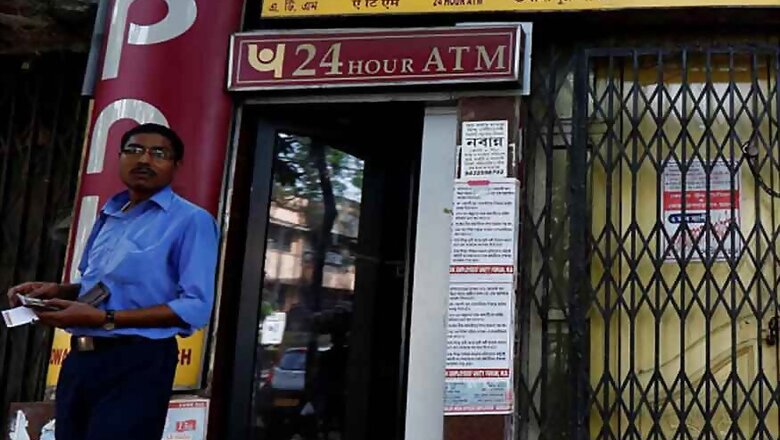
views
New Delhi: Screaming headlines have proclaimed this morning that India’s largest corporate fraud has been discovered at the state-owned Punjab National Bank (PNB). And the alleged fraudster, billionaire jeweller Nirav Modi, may have already fled the country.
Some other reports suggest Modi is willing to clear a part of the fraudulent loans. This brings to mind striking similarities between the modus operandi of Modi and another Indian billionaire who used and abused the state-owned banks to further his own greed -- Vijay Mallya. Any charges of crony capitalism, after the latest PNB saga, will be hard to deflect. Another state-owned bank, Bank of Baroda, is already under the scanner for alleged compliance lapses in South Africa, pertaining to advances it made to one influential Indian business family there.
BOB is, in fact, shutting shop in South Africa after these allegations.
What is it with India’s state-owned banks? Large systemic inconsistencies which have led to an unprecedented bad loan book or unchecked politician-businessman connivance to work defraud the system? In the case of PNB, was there political collusion too or was the entire fraud perpetrated by just junior bank officials?
PNB has itself disclosed the fraud in a stock exchange filing, saying fraudulent and unauthorised transactions had been detected at one of its branches in Mumbai and the quantum of such transactions was $1771.69 million or close to Rs 11,000 crore. That is five-and-a-half times the size of the allocation the Centre has made to its universal health scheme, Modicare, in the budget for 2018-19.
PNB’s disclosure has had the expected fallout with its share price tanking, market capitalization falling and others, but the larger risk is this -- it has shattered the faith of the Indian saver who prefers to park his hard earned money in a ‘sarkari’ bank.
That faith was recently anyway called into question when the FRDI Bill proposed immunity of just Rs one lakh of our savings in banks. This bill provides for the setting up of a Resolution Corporation to monitor financial firms and take corrective action, guard against such firms’ failure. The corporation will also provide deposit insurance up to Rs one lakh in the event of a bank failure. Basically, depositors’ funds may be used to avoid bank failures. The PNB saga is perhaps the last nail in the coffin for depositors.
The PNB saga is shocking, no doubt, but not a one off case. Our banks seem to be routinely dealing with large amounts which are classified as being under frauds, mostly frauds while making advances. There is enough evidence from the past to show why our state owned banks are far from being immune to frauds.
In July last year, Minister of State for Finance, Santosh Kumar Gangawar, shared deeply disturbing figures of amounts under fraud at various public sector banks. Is it any surprise that PNB topped the list – it had the largest amount under fraud – in 2016-17 at Rs 2808.27 crore. That averages to Rs 7.7 crore every single day of the year. The amount that PNB said was under fraud was bigger than even that declared by the country’s largest bank, State Bank of India. The amount involved under all frauds at SBI was Rs 2422.37 crore.
There are various types of frauds at our state owned banks. Some happen due to gaps in credit under-writing standards, some due to liberal cash flow projections at proposal stage, some others due to lack of continuous monitoring of cash flow and cash profits (EBITDA), some because of willful diversion of funds etc. The moot point is that funds which our banks classify as being under frauds are huge – the RS answer quoted above says the total amount under all types of fraud at all banks (state owned as well as private) was a staggering Rs 23,902.63 crore in 2016-17.
In the last five years till 2016-17, PNB declared a loss of a staggering Rs 8999.17 crore on account of frauds, again the highest among all state owned banks. Or in other words, it lost Rs 5 crore every single day due to frauds. And we think parking our life’s savings in a sarkari bank is the smartest thing to do? Big brother State Bank of India lost Rs 6228.01 crore during the same period due to frauds.
And this piece says PNB is not the only bank which will be affected by the collusion of Nirav Modi and some bank officials in perpetrating the largest fraud in history. Initial investigations suggest that Allahabad Bank, Axis Bank and Union Bank had funded close to Rs 7,000 crore in this intricate web of deals and may also face the music.
There should be thorough and detailed investigation into the goings on at PNB, not only to recover some of the defrauded amount but to also get the ‘aam aadmi’ to once again trust his savings with India’s state owned banks.
(The author is senior journalist)




















Comments
0 comment